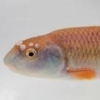feeding mealworms and crayfish
#1
 Guest_FirstChAoS_*
Guest_FirstChAoS_*
Posted 01 February 2010 - 12:18 AM
Mealworms: I have heard mixed views on feeding mealworms to fish, some sources call them safe, others mentioned their chewing mouthparts can cause internal damage. Are these safe to feed fish?
Crayfish: Would small crayfish be safe to put in my 55 gallon for my big shiners, perch, and rockbass? I worry about them hurting my logperch or my algea eater as they dwell on the bottom.
#2
 Guest_gzeiger_*
Guest_gzeiger_*
Posted 01 February 2010 - 04:33 AM
I have mixed views on the crayfish question. I routinely add juvenile crayfish as large as 2.5 inches to a tank containing bluegill, green and redbreast sunfish. Bottom dwellers are also present but are the sort that can take care of themselves (bullheads and fat sleepers). This has never caused me a problem. However, I have in the past lost darters and killifish to larger crayfish and I can't promise that wouldn't happen. I think you'd be ok though if you used only small ones and the tank has only moderate cover for them to hide and grow large.
#4
 Guest_gzeiger_*
Guest_gzeiger_*
Posted 01 February 2010 - 05:41 AM
My bluegill are quite happy to swallow whole any crayfish that fits in their mouths, and to swallow in pieces most that don't. Those have a lot sharper and harder parts than any mealworm. Insects are a perfectly natural diet and aren't going to kill your fish.
#5
 Guest_jase_*
Guest_jase_*
Posted 01 February 2010 - 09:14 AM
#7
 Guest_centrarchid_*
Guest_centrarchid_*
Posted 01 February 2010 - 09:49 AM
You are correct in that bass do not chew their food. Relatives like the redear, pumpkinseed, bluegill and other Lepomis spp. can kill by triturating / chopping up the ingested prey to a varying degrees with their pharyngeal teeth. The bass' pharyngeal teeth function more to rachet large good items into the stomach with minimal trituration and "usually" not enough to kill the prey item. To get around this problem, your bass has a very tough stomach lining that can operate normally even when punctured by something like a channel catfish spine. Something in the stomach also kills the prey item extremely rapidly once part of the prey enters the stomach volume. It is as if they become paralyzed.
Also, the meal worms die very quickly when immersed in water, probably not providing enough time to cause significant damage.
#9

Posted 01 February 2010 - 12:52 PM
Seems like you got enough mealworm answers... I will go back to the crayfish thing... crayfish are a bad deal... they tear up plants and substrate and they roam about at night and eat sleping fish... and not jsut darters, but shiners as well... only add crayfish that your fish can eat... if they are bigger than that, you can send them to me and I will eat 'em! But I will not put them in a tank with shiners or darters... been there done that... lost the fish...Crayfish: Would small crayfish be safe to put in my 55 gallon for my big shiners, perch, and rockbass? I worry about them hurting my logperch or my algea eater as they dwell on the bottom.
#10
 Guest_SunnyRollins_*
Guest_SunnyRollins_*
Posted 05 February 2010 - 10:29 AM
I too am troubled about the meal worm feeding. These things are tough and my bass doesn't chew his prey. I worry myself that the mandibles of the meal worm (or other insect) can cause internal damage.
this myth never goes away. i wish it would.
i have yet to see a mealworm feast on an animal, living or dead, or even hear of one eating an animal's stomach.
crickets, on the other hand, feed on dead cagemates all the time....and no one worries about them ridiculously eating their herps from the inside out...why isn't that a myth?
Reply to this topic
0 user(s) are reading this topic
0 members, 0 guests, 0 anonymous users









